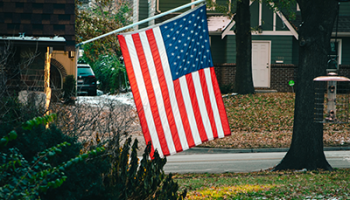VA Home Loan Misconceptions
State College VA Home Loan Misconceptions
There are several myths and misconceptions attached to VA home loans. These have led to people sometimes shying away from enjoying the full benefits of this program. What, exactly is a VA home loan? VA home loans are funds set aside by The Department of Veteran Affairs to help veterans, service members, and eligible surviving spouses own homes. VA home loans are issued by private financial institutions such as mortgage companies and banks and guaranteed by the Department of Veteran Affairs.
To ease the loan and mortgage burden, VA steps in as guarantors to a portion of the loan. This way, the lenders can offer those eligible a more favorable deal. VA loans also can help you build, repair, retain and modify your home to fit your needs.
Most of the misconceptions surrounding these loans are based on inaccurate information on eligibility. Don't let lack of knowledge be what stops you from enjoying the full benefits of the VA home loan benefits.
To help clear up the confusion that sometimes accompanies VA home loans, and to understand how VA home loans work, we discussed them with State College mortgage broker D. Shane Whitteker - owner and chief broker at Principle Home Mortgage. Here are few misconceptions explained to help you make an informed decision.
VA Loan Misconception: VA loans come from and are funded by the Department of Veteran Affairs
VA Loan Reality: It's a common myth that VA home loans are issued and paid for by the Department of Veteran Affairs. However, this is not the case. These loans are issued by private financial institutions such as banks and mortgage firms and are guaranteed by the Department of Veteran Affairs. This program was signed into law back in 1944 by the US government to help service members own homes without needing excellent credit or paying a down payment.
“VA home loans are funded by lenders and banks,” Whitteker says. “The VA offers an insurance program on the money that the lender funds for the VA mortgage. This insurance is designed to facilitate the guidelines set by the VA for the insurance policy. This results in an aggressive mortgage product for veterans.”
VA Loan Misconception: It is impossible to know if the house qualifies for a VA home loan
VA Loan Reality: Speak with your local mortgage broker. The Department of Veteran Affairs has laid down specific guidelines to help applicants ascertain if their home qualifies for the loan in conjunction with the lenders. Several home choices may be of interest to you. However, to get final loan approval, you’ll want to speak with your mortgage broker and keep the following in mind:
Condominiums: Condos can get approval for VA financing. However, the entire complex may need to get VA approval before you can buy a particular unit. Some of the documents that may need to be reviewed include the title deed, parking availability, homeowner's association policies, and organizational policies.
Manufactured homes: To earn approval, your home must meet the following VA conditions.
• It must be properly affixed to a permanent foundation.
• Single-wide homes need to cover at least 400-square feet. At the same time, double-wide homes need to cover a minimum of 700sq-ft.
• The home needs to have permanent cooking, eating, sleeping, and sanitation spaces.
Modular Homes: This type of home can get approval for VA home loans. However, they need to be attached to a permanent foundation. They also need to follow HUD guidelines and receive certification from the respective state your building is in.
New construction: Getting VA approval for a VA construction loan is possible. However, construction must be done according to certain VA guidelines. Most new homes are built to these specifications currently. The builder will also need to obtain a VA registration number.
VA Loan Misconception: I am going to use a VA loan to fund to buy an investment property
VA Loan Reality: VA home loans are primarily intended to help service members and veterans purchase or build homes they seek to settle in. This means you can’t get approval to fund the purchase of an investment property.
According to Whitteker, it’s a matter of occupancy.
"You can’t actually do this,” Whitteker says. “The home must be occupied by you or by your family if you are currently serving in the military.”
VA Loan Misconception: If I pay my VA loan early, there will be penalties
VA Loan Reality: VA loans have no prepayment penalties. You can choose to clear your loan beforehand or make additional payments without attracting any penalties. In general, mortgages on primary residences no longer are issued with any form of pre-payment penalty.
VA Loan Misconception: There is no funding fee with a VA loan
VA Loan Reality: Whitteker says this is only true if you’re a disabled veteran.
“This is only the case for veterans listed with a “disabled” status with the VA,” Whitteker says. “This status will be indicated on the certificate of eligibility issued by the VA. All other veterans will pay a funding fee to utilize this program.”
VA loans have a funding fee that varies depending on the amount borrowed. According to the 2021 report, the fee is approximately 2.3% of the amount borrowed. This fee increases to 3.6% to individuals who have used the VA loan program in the past. However, this value can be reduced by placing a 5% down payment at closing.
VA Loan Misconception: I don't have 20% to put down on my VA loan, so I'll have to get a mortgage insurance
VA Loan Reality: VA loans don't require any down payment. However, this doesn't mean you can't choose to make a down payment for the borrowed loan. Not having a down payment doesn't disqualify you from securing a loan. Many applicants choose to put down a down payment to reduce the loan cost and speed up the approval time.
VA Loan Misconception: I already bought a house with a VA loan when I was younger. I am only allowed to get one VA loan
VA Loan Reality: According to Whitteker, those eligible can have two VA mortgages at the same time.
“You can actually have two outstanding VA loans at the same time,” Whitteker says.
However, Whitteker says you’ll want to keep an eye on how much VA benefits are left over once you have your first VA loan.
“There are requirements for how much entitlement is available which is how the insurance for the bank is funded,” Whitteker says. “For example, if you have an existing VA mortgage and want to purchase another home before paying off the existing VA mortgage, you will have to purchase a home with at least a $144,000 purchase price. I know it seems odd but that is a VA rule.”
Veterans and service members can enjoy VA loan benefits more than once. All you need to do is meet all the requirements to become eligible to reuse your benefit and even get a new VA loan approval. Many veterans have obtained a second VA loan approval.
VA Loan Misconception: Getting a certificate of eligibility is a difficult and cumbersome experience.
VA Loan Reality: On the contrary, it's easy to get a certificate of eligibility for a VA loan once you meet all the requirements. Getting a certificate takes up to 6 weeks. This time frame that is pegged on various factors; some of these include requesting the document through the mail and the time since you served. In most cases, you may not have to go through the entire process, as some mortgage brokers can request your COE on your behalf.
VA Loan Misconception: I'm not sure what acceptable proof of my military service is?
VA Loan Reality: “Your DD-214 typically will have all of the information that you need,” Whitteker says. “You should also be able to pretty easily obtain a certificate of eligibility which will let you know if you have met the requirements set by the VA to qualify.”
To qualify for a VA loan, one needs to meet one of the following requirements.
• One must have served at least 90 days of service during a war.
• Offered 181 days of service during a peaceful period.
• Six years of creditable service in the Reserves or National Guard
• Must have served 90 days under Title 32 with 30 consecutive days of service.
• Service time is not required for individuals discharged due to a service-related disability.
There are specific documents required for you to meet the eligibility requirements for your service time. These documents include:
• A copy of the DD Form 214 is for the veterans discharged after January 1950.
• Certificate of Release and Discharge From Active Duty attached to VA Form 26-1880.
• DD Form 214 copy 4 for veterans discharged after October 1979.
You don't have to avail the original copy of the documents. A certified photocopy of the same will suffice.
VA Loan Misconception: My ex-wife is a veteran, so I am eligible for a VA loan
VA Loan Reality: An eligible veteran can get approval for a VA home loan. A veteran’s spouse does not qualify unless the veteran is applying with the veteran’s spouse, or the spouse is considered a surviving spouse of a veteran deceased in the line of duty or with duty related injury.
It's best to get all the necessary facts concerning VA loans to make an informed decision. Principle Home Mortgage are the State College VA home loan experts - call them at (814) 308-0959 today.
A Look At State College VA Home Loans
VA home loans in State College are one of the best ways to finance a home purchase. Available to eligible veterans and their spouses, these mortgages are backed by the Department of Veterans Affairs.
Step-By-Step Guide to Saving Money as a First Time Home Buyer
As a first time home buyer, you'll want to prepare for the process. Our first time home buyer guide is a great place to start!
First Time State College Home Buyer Mortgage Tips: Navigating the Home Buying Process
Navigating the home buying process - in State College or anywhere in Pennsylvania - can be complex. In this article we examine some 'inside tips' to help get you a great mortgage for the home you're dreaming of.




